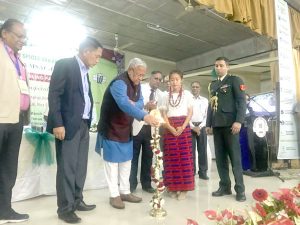Nagaland
Seminar-dazed Acharya wonders if state’s seminars bring changes

Eastern Mirror Desk
Dimapur, March 15: The governor of Nagaland PB Acharya is critical of the seminars and workshops in Nagaland that seem to have little or ‘no result.’ He also held universities responsible ‘for the poor economy of the country.’
The governor was addressing a conference on spice and aromatic crops—named the “symposium on spices and aromatic crops; SYMSAC—which was inaugurated at the School of Agricultural Sciences and Rural Development (SASRD) of Nagaland University (NU), at Medziphema in Dimapur on March 15. He was the event’s chief guest.
The SASRD and Indian Society for Spices at Kozhikode in Kerala and Nagaland’s department of Horticulture and Agriculture organised the three-day conference which broached issues about spices ‘doubling farmer’s income.’ The event was conducted in collaboration with the Indian Council of Agricultural Research (ICAR), Indian Institute of Spices Research (IISR), and the DASD at Kozhikode; North East Council in Shillong; the North Eastern Regional Agricultural Marketing Corporation Limited at Guwahati, and the Horticultural Society of North East India at Medziphema.
Gov. Acharya questioned the SASRD for failing to produce ‘end results’ after every ‘SYMSAC.’ He reminded that the Horticulture department has to play a pivotal role in making Nagaland a ‘golden state’ which, according to the governor, they failed. “Nagaland has plenty of medicinal plants but the university is not initiating to tap such study,” he said.
Acharya recounted his trip to Mon district and meeting with farmers of an ‘unrecognised village’ which he said was surprising—an ‘unrecognised village’ a common statement in the state where villages without government recognition are not entitled any government funds and schemes. The farmers there were selling organic cardamom at a price of INR 270 per kg, he said. The crop was then sold at double the price in the neighbouring state. Strengthening the sector should be the goal of horticulture, Acharya told the gathered officials.
“Through this symposium, find out the situation of our state and not let this be a day’s event but a constructive symposium,” he told the conference.
Also, the governor invited to Kohima the university after the symposium for ‘more interaction with the intention that the symposium does not turn out to be just an event but bring an outcome.’
The organising secretary of SYMSAC Dr. CS Maiti addressed the event. He said that the symposium ‘will not be a mere symposium.’ Its outcome will be the ‘first draft recommendation for road map in respect to spice production and spices industry for the north east which will be forwarded to the director general of the ICAR.’ This is for the development of the spice industry in Northeast, the gathering was told.
The additional director of the department of Agriculture, Butang, also remarked in his addressed that “more than 70% of our population is engaged in agriculture but are not self-sufficient in our food items, poor in overall economy.” It is because the farming system and the crop productivity system being followed is ‘of subsistence level where our hard working farmers are not getting remunerative returns for their work from their farms.’
‘It is an issue for all of us—scientist, researchers, and teaching community and extension workers. In spite of suitable micro climatic condition for growing different crops, many of our farmers are still clinging on to the traditional low yielding jhum system, Butang said.
To doubling farmers’ income, the speaker said, ‘we promote farm mechanisation in the agriculture wherever feasible and practise double, inter relay and mixed cropping, we also identify for promotion of local cultivators of different crops.’
The department of agriculture, he said, has ‘taken up’ 118 villages with 6000 ha approximately involving 6304 farmers for organic cultivation through the Mission Organic Value Chain Development.
Further, the Horticulture department is involved in producing and selling ‘high value less volume, less perishable spices keeping in view the poor road connectivity and long distance marketing methods, the director of Horticulture Dr. R. Elithung Lotha also said. The department also promotes spices though the Mission for Integrated Development of Horticulture and the Rashtriya Krishi Vikas Yojana. It is doing so by facilitating quality planting materials and post-harvest inputs, the gathering was informed.
NU’s Vice Chancellor Prof. Pardeshi Lal who was attending the event as the guest of honour exhorted the experts to engage ‘quality crops that double’ the economy of farmers. Likewise, he urged them to take ‘advantage of the state’s suitable agro-climate.’
A mobile app for farmers developed by the IISR was launched during the event.
Also, during the event, farmers were given recognition. The ‘best farmer’ award was given to Thejamo Ovung of Wokha district from Nagaland for ginger. It was presented by the Indian Society for Spices.

